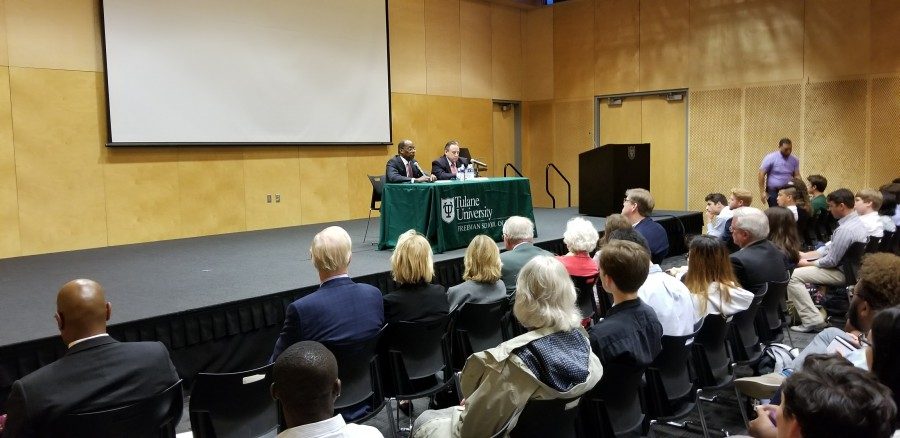TIAA CEO addresses students on changing economic trends
Courtesy of Mike Tetuan
Ferguson delivered Tulane’s 2017 R. W. Freeman Distinguished Lecture on Wednesday, Nov. 8, to address economic trends.
Today’s changing economic and demographic spheres are not only affecting businesses, but also students, according to Roger W. Ferguson Jr., president and CEO of Teachers Insurance and Annuity Association. Ferguson delivered Tulane’s 2017 R. W. Freeman Distinguished Lecture on Wednesday, Nov. 8, in which he addressed students’ questions and concerns about economic trends.
In addition to serving TIAA, a Fortune 100 company and the leading provider of financial services in academic, cultural, medical and cultural fields, Ferguson has served as the vice chairman of the Board of Governors of the U.S. Federal Reserve. At the lecture, Ferguson shared his expertise in financial issues.
Ira Solomon, dean of the A. B. Freeman School of Business, opened to an audience of more than 500 community members.
“Mr. Ferguson has a tremendous breadth and depth of experience,” Solomon said. “In fact, calling him an economist is really an understatement because he is much more than an economist or an advanced field leader.”
After introducing Ferguson and recognizing members of the Freeman family who attended the event for the family’s generosity, Solomon opened the floor to questions from the audience. Topics ranged from career advice and his role in the Federal Reserve to his view on the changing retirement landscape and on the topic of student debt.
Throughout the facilitated Q&A session, Ferguson used his knowledge and expertise to answer the issues most relevant to students, such as their ability to get the jobs they want after graduation.
He elaborated on the changing job market in an in-person interview with The Hullabaloo.
“Students are [graduating] at a time when the job market in an overall sense seems very strong, with unemployment down at historically low levels — 4.3, 4.4 percent,” Ferguson said in the interview. “And yet many students are interested and concerned about whether or not the skills they are developing and learning in school are going to translate into a good job.”
One of these concerns, which Ferguson addressed in the Q&A session, is the ability for students to navigate the market with changing technology. At the lecture, Solomon asked whether he thought artificial intelligence would take jobs away from people. In response, Ferguson compared the emergence of AI to the move from an agricultural society to an industrial one.
“When that process [of industrialization] first started, no one could have imagined what the jobs of the then-future would look like,” Ferguson said in response to Solomon’s question. “And I think we’re confronting the same thing … While I can’t predict what those jobs are going to be, I am highly optimistic that we will develop new jobs that impact and work with AI.”
According to Ferguson, students’ ability to develop the skills necessary to adapt to these new jobs would impact their success. Another skill Ferguson said he believes is important to students is their ability to understand and manage their financial resources.
“All of us have an obligation both as students and the faculty … to think about [how] to overcome that low degree of financial capability, financial literacy among students these days,” Ferguson said in the interview with The Hullabaloo.
Ferguson said he was impressed by the number of non-business majors at Tulane taking classes in the business school. He said it was important for students to take advantage of all the resources Tulane has to offer because it is difficult to predict how a career might unfold.
“The analogy that we use when talking about careers is often a career ladder, and my experience is that careers are more like rock climbing walls,” Ferguson said in the interview. “If you’ve ever gone up a rock climbing wall, you know that path is not always clear. Sometimes you take a lateral move. Sometimes even a move back in order to circumvent a big rock or boulder, something that’s in your way to find a path forward.”
Your donation will support the student journalists of Tulane University. Your contribution will allow us to purchase equipment and cover our annual website hosting costs.




